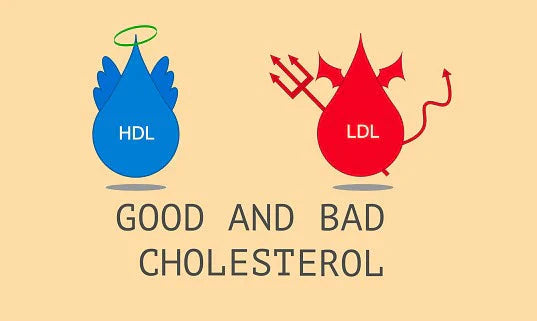
Things You Should Know About LDL: The "Bad" Cholesterol
Time to read 4 min
Time to read 4 min
Cholesterol is a fat-like, waxy substance, available in all the body cells. Your liver makes cholesterol, which helps your body to work properly. Some foods, such as dairy products and meat, produce cholesterol in your body. However, excess cholesterol levels in the blood can raise the risk of heart disease like coronary artery disease.
LDL stands for low-density lipoproteins, which are also known as bad cholesterol. A high LDL level causes a buildup of cholesterol in your arteries. LDL particles contain a significant amount of cholesterol and a smaller amount of proteins. Excessive LDL cholesterol can put you at higher risk of a heart attack or stroke.
You should know that LDL cholesterol is not bad, as cholesterol plays a vital role in the body. However, your cholesterol levels can cause several heart issues. Hence, LDL is called the bad cholesterol.
If you have a high LDL level, it means you have excessive LDL cholesterol in your blood. This excessive LDL forms plaque in your arteries that may cause atherosclerosis. Coronary artery disease occurs when plaque buildup is in the arteries of your heart.
It hardens and narrows the arteries, which slows down or blocks the blood flow to the heart. This condition can cause angina (chest pain), blockage of the heart, or a heart attack.
Several things affect the cholesterol levels. Sometimes you can control cholesterol levels by dieting and doing physical activities. Some other things, like genetics and age, also influence cholesterol levels. Several things that may raise the LDL cholesterol are;
If you experience these causes, you must talk with your physician as soon as possible.
High LDL bad cholesterol levels make you more likely to have various problems like peripheral artery disease and coronary artery disease. It also increases your risk for stroke and heart attack. To lower your cholesterol levels, you can consult with your doctor to get the best advice. Usually, doctors use a calculator to consider several factors, such as your cholesterol level, blood pressure, your age, and whether you smoke. All these factors increase the chances of a rise in your LDL.
You can do a lot of things to lower your blood cholesterol level. Most people start with lifestyle changes to control their LDL cholesterol levels. Several things that you can do to lower your LDL cholesterol are;
Be more active: You should aim for at least 30 minutes of aerobic exercise every day for at least five days a week. You can start slow and gradually work your way up. You can consult your healthcare provider before starting a new exercise plan or making any changes to your old routine.
Avoid tobacco use: If you smoke or use any tobacco products, you must quit it to reduce the bad cholesterol in your body.
Consume healthy foods: According to research, a Mediterranean diet helps to lower cholesterol levels in your blood. This plan encourages you to eat healthy fats and avoid unhealthy fats.
Maintain your weight: You can consult with your healthcare provider to get an idea about what your ideal weight should be. By maintaining a healthy body weight, you can reduce LDL and maintain a healthy life.
Lower your stress: Overstress for a long time may increase your LDL cholesterol and reduce good cholesterol in your blood. If you have a stress issue, you must consult your physician ASAP. You can practice deep breathing or yoga to manage the amount of cholesterol in your body.
Besides, following these tips, you should discuss your current medical regimen with your healthcare provider. Proper suggestions, lifestyle, and medicines can surely reduce the scope of heart disease that happens due to high LDL.
Some cholesterol is important for the body to function properly. However, excessive LDL or bad cholesterol leads to plaque buildup in the arteries. It causes several heart complications. Hence, it is important to consult with your healthcare provider to keep your LDL level in the normal range. For many people, lifestyle changes make a significant difference. But if your LDL is still high, you should take good medical advice.
Is LDL cholesterol good or bad?
LDL cholesterol is considered bad cholesterol as high levels of LDL increase the risk of heart disease and stroke. It builds up in the arteries and forms plaque that blocks the blood flow.
What level of LDL cholesterol is bad?
LDL cholesterol level of 130 to 159 mg/dl is considered bad. With this cholesterol level, you must consult a doctor for proper medical assistance.
What will happen if LDL is high?
High levels of LDL cholesterol or bad cholesterol, increase the risk of heart disease and stroke.
How do I lower my LDL quickly?
To lower your LDL quickly, you need to follow a few tips that include;
* * Medical Disclaimer - The following information is for educational purposes only. No information provided on this website, including text, graphic, and images, are intended as substitutes for professional medical advice. Please consult with your doctor about specific medical advice pertaining to your condition(s).





